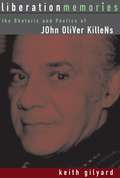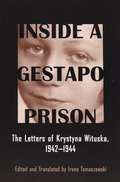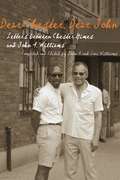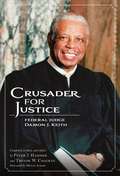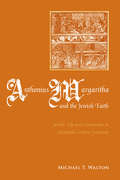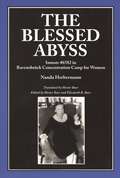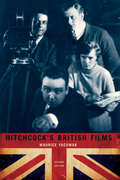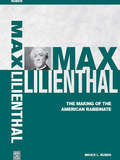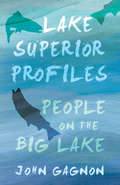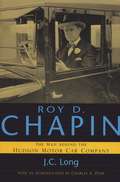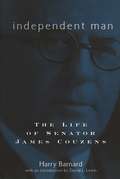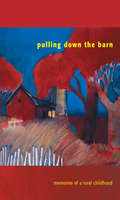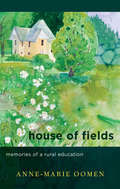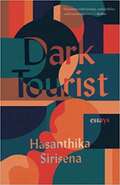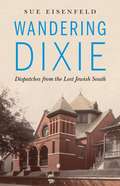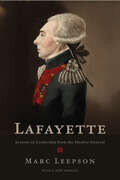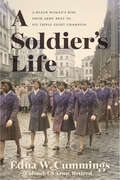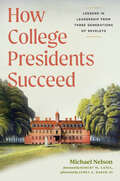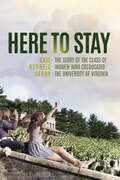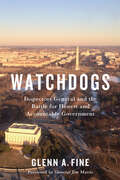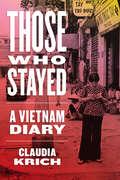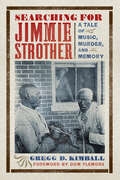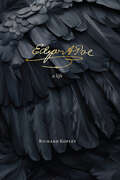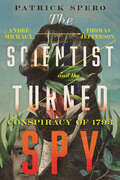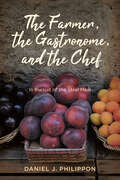- Table View
- List View
Liberation Memories: The Rhetoric and Poetics of John Oliver Killens
by Keith GilyardNo serious history of the development of the African American novel from the 1950s onward can be written without reference to John Oliver Killens. A two-time nominee for the Pulitzer Prize and founding chairman of the legendary Harlem Writers Guild, Killens was regarded by many as a spiritual father who inspired a generation of African American novelists with his politically charged works. And yet today he rarely receives proper critical attention. Seeking to strengthen our understanding of this important literary figure, Keith Gilyard departs from standard critical frameworks to reveal Killens's novels as artful renderings of rich African American rhetorical forms and verbal traditions. Gilyard finds that many critics, adhering to ideals of art for art's sake or narrative conciseness, are ill-equipped to appreciate the many ways in which Killens's fiction succeeds. Rejecting the "pure art" position, Killens sought to articulate Black heroism particularly within a family or community context, offering a set of values he deemed liberatory. He focused on rendering noble and polemical characters, and his work represents a distinguished fusion of sociopolitical persuasion (rhetoric) and literary artifact (poetics). To help illuminate such novels as Youngblood (1954), And Then We Heard the Thunder (1962), and The Cotillion (1971), Gilyard examines Killens's work as an essayist and cultural organizer, highlighting his activism. His life and literary production can be partly characterized, Gilyard suggests, by the African American jeremiad--a major rhetorical form in the Black intellectual tradition expressing faith that America's destiny is to become an authentic, pluralistic democracy.
Inside a Gestapo Prison: The Letters of Krystyna Wituska, 1942-1944
by Irene TomaszewskiOn the eve of World War II, Krystyna Wituska, a carefree teenager attending finishing school in Switzerland, returned to Poland. During the occupation, when she was twenty years old, she drifted into the Polish Underground. By her own admission, she was attracted first by the adventure, but her youthful bravado soon turned into a mental and spiritual mastery over fear. Because Krystyna spoke fluent German, she was assigned to collect information on German troop movements at Warsaw's airport. In 1942, at age twenty-one, she was arrested by the Gestapo and transferred to prison in Berlin, where she was executed two years later. Eighty of the letters that Krystyna wrote in the last eighteen months of her life are translated and collected in this volume. The letters, together with an introduction providing historical background to Krystyna's arrest, constitute a little-known and authentic record of the treatment of ethnic Poles under German occupation, the experience of Polish prisoners in German custody, and a glimpse into the prisons of Berlin. Krystyna's letters also reflect her own courage, idealism, faith, and sense of humor. As a classroom text, this book relates nicely to contemporary discussions of racism, nationalism, patriotism, human rights, and stereotypes.
Dear Chester, Dear John: Letters between Chester Himes and John A. Williams
by John A. Williams Lori WilliamsChester Himes and John A. Williams met in 1961, as Himes was on the cusp of transcontinental celebrity and Williams, sixteen years his junior, was just beginning his writing career. Both men would go on to receive international acclaim for their work, including Himes's Harlem detective novels featuring Grave Digger Jones and Coffin Ed Johnson and Williams's major novels The Man Who Cried I Am, Captain Blackman, and Clifford's Blues. Dear Chester, Dear John is a landmark collection of correspondence between these two friends, presenting nearly three decades worth of letters about their lives and loves, their professional and personal challenges, and their reflections on society in the United States and abroad. Prepared by John A. Williams and his wife, Lori, this collection contains rare and personal glimpses into the lives of Williams and Himes between 1962 and 1987. As the writers find increasing professional success and recognition, they share candid assessments of each others' work and also discuss the numerous pitfalls they faced as African American writers in the publishing world. The letters offer a window into Himes's and Williams's personalities, as the elder writer reveals his notoriously difficult and suspicious streak, and Williams betrays both immense affection and frustration in dealing with his old friend. Despite several rifts in their relationship, Williams's concern for Himes's failing health ensured that the two kept in touch until Himes's death. Dear Chester, Dear John is a heartfelt and informative collection that allows readers to step behind the scenes of a lifelong friendship between two important literary figures. Students and teachers of African American literature will enjoy this one-of-a-kind volume.
Crusader for Justice: Federal Judge Damon J. Keith
by Mitch Albom Peter J. Hammer Trevor W. ColemanThe Honorable Damon J. Keith was appointed to the federal bench in 1967 and has served as a judge on the United States Court of Appeals for the Sixth Circuit since 1977, where he has been an eloquent defender of civil and constitutional rights and a vigorous enforcer of civil rights law. In Crusader for Justice: Federal Judge Damon J. Keith, authors Peter J. Hammer and Trevor W. Coleman presents the first ever biography of native Detroiter Judge Keith, surveying his education, important influences, major cases, and professional and personal commitments. Along the way, the authors consult a host of Keith's notable friends and colleagues, including former White House deputy counsel John Dean, Supreme Court Justice Clarence Thomas, and industrialist Edsel Ford II for this candid and comprehensive volume.Hammer and Coleman trace Keith's early life, from his public school days in Detroit to his time serving in the segregated U.S. army and his law school years at Howard University at the dawn of the Civil Rights era. They reveal how Keith's passion for racial and social justice informed his career, as he became co-chairman of Michigan's first Civil Rights Commission and negotiated the politics of his appointment to the federal judiciary. The authors go on to detail Keith's most famous cases, including the Pontiac Busing and Hamtramck Housing cases, the 1977 Detroit Police affirmative action case, the so-called Keith Case (United States v. U.S. District Court), and the Detroit Free Press v. Ashcroft case in 2002. They also trace Keith's personal commitment to mentoring young black lawyers, provide a candid look behind the scenes at the dynamics and politics of the Sixth Circuit Court of Appeals, and even discuss some of Keith's difficult relationships, for instance with the Detroit NAACP and Supreme Court Justice Clarence Thomas. Judge Keith's forty-five years on the bench offer a unique viewpoint on a tumultuous era of American and legal history. Readers interested in Civil Rights-era law, politics, and personalities will appreciate the portrait of Keith's fortitude and conviction in Crusader for Justice.More information can be found at crusaderforjustice.com
Anthonius Margaritha and the Jewish Faith: Jewish Life and Conversion in Sixteenth-Century Germany
by Michael T. WaltonA biography of Anthonius Margaritha, convert to Christianity and reporter on Jewish life and religious practices.
The Blessed Abyss: Inmate #6582 in Ravensbrück Concentration Camp for Women
by Hester Baer Elizabeth R. Baer Nanda HerbermannOn February 4, 1941, Nanda Herbermann, a German Catholic writer and editor, was arrested by the Gestapo in Münster, Germany. Accused of collaboration with the Catholic movement, Herbermann was deported to Ravensbrück Concentration Camp for Women in July 1941 and later released upon direct orders from Heinrich Himmler on March 19, 1943. Although she was instructed by the Gestapo not to reveal information about the camp, Herbermann soon began to record her memories of her experiences. The Blessed Abyss was originally published in German under the imprint of the Allied occupation forces in 1946, and it now appears in English for the first time. Hester Baer and Elizabeth Baer include an extensive introduction that situates Herbermann's work within current debates about gender and the Holocaust and provides historical and biographical information about Herbermann, Ravensbrück, and the Third Reich.
Hitchcock’s British Films: Second Edition (Contemporary Approaches To Film And Media Ser.)
by Maurice YacowarA reissued classic that examines the structure and themes of each of Hitchcock's British feature films.
Max Lilienthal: The Making of the American Rabbinate
by Bruce L. RubenExplores the life and thought of Rabbi Max Lilienthal, who created a new model for the American rabbinate.
Lake Superior Profiles: People on the Big Lake
by John GagnonIntroduces readers to ordinary, offbeat, and interesting people living on and around Lake Superior.
Roy D. Chapin: The Man Behind the Hudson Motor Car Company
by Charles K. Hyde J. C. Long"John Cuthbert Long's Roy D. Chapin is a thorough and detailed biography of a remarkable, but little-known Detroit automobile industry pioneer. Historians should include Roy Dikeman Chapin (February 23, 1880-February 16, 1936) in any listing of significant American auto industry pioneers, along with the Duryea brothers, Ransom E. Olds, Henry Leland, Henry Ford, William C. Durant, and the Dodge brothers. Outside the cloister of automotive historians, Roy Chapin is an unknown. This is in part because no company or car bore his name. Unlike many contemporary auto pioneers, Roy Chapin was a modest man who did not promote himself. Even Long's superb biography of Chapin is not well-known because it was privately printed in 1945 with a small press run. In reprinting this volume, Wayne State University Press is making an important contribution to automotive history."--From the introduction by Charles K. Hyde, Department of History, Wayne State University
Independent Man: The Life of Senator James Couzens (Great Lakes Books Series)
by Harry BarnardFirst published in 1958 by Charles Scribner's Sons, Independent Man is the only book-length biography of one of Michigan's most remarkable men. His many careers embraced both the business and political spheres. Couzens was a prominent business man who helped shape Ford Motor Company but he left the company when he and Henry Ford clashed over politics. Upon leaving Ford, Couzens began his career in politics. He first served as Detroit's police commissioner. He went on to a controversial term as mayor of Detroit and then represented Michigan in the U. S. Senate. This book reveals the life of a truly unique and inspirational man.
Pulling Down the Barn: Memories of a Rural Childhood
by Anne-Marie OomenBlending artful language and style with the dirt, blood, and sweat of farm life, this collection of essays tells a moving story of growing up in rural Michigan.
House of Fields: Memories of a Rural Education
by Anne-Marie OomenThe follow-up to Pulling Down the Barn, House of Fields is a collection of evocative personal essays that recall the many facets of a young girl's formal and informal education in rural Michigan.
Dark Tourist: Essays (21st Century Essays Series)
by Hasanthika SirisenaDark tourism—visiting sites of war, violence, and other traumas experienced by others—takes different forms in Hasanthika Sirisena’s stunning excavation of the unexpected places (and ways) in which personal identity and the riptides of history meet. The 1961 plane crash that left a nuclear warhead buried near her North Carolina hometown, juxtaposed with reflections on her father’s stroke. A visit to Jaffna in Sri Lanka—the country of her birth, yet where she is unmistakably a foreigner—to view sites from the recent civil war, already layered over with the narratives of the victors. A fraught memory of her time as a young art student in Chicago that is uneasily foundational to her bisexual, queer identity today. The ways that life-changing impairments following a severe eye injury have shaped her thinking about disability and self-worth. <p><p> Deftly blending reportage, cultural criticism, and memoir, Sirisena pieces together facets of her own sometimes-fractured self to find wider resonances with the human universals of love, sex, family, and art—and with language’s ability to both fail and save us. Dark Tourist becomes then about finding a home, if not in the world, at least within the limitless expanse of the page.
Wandering Dixie: Dispatches From The Lost Jewish South
by Sue EisenfeldSue Eisenfeld is a Yankee by birth, a Virginian by choice, an urbanite who came to love the rural South, a Civil War buff, and a nonobservant Jewish woman. In Wandering Dixie, she travels to nine states, uncovering how the history of Jewish southerners converges with her personal story and the region's complex, conflicted present. In the process, she discovers the unexpected ways that race, religion, and hidden histories intertwine. From South Carolina to Arkansas, she explores the small towns where Jewish people once lived and thrived. She visits the site of her distant cousin and civil rights activist Andrew Goodman's murder during 1964's Freedom Summer. She also talks with the only Jews remaining in some of the "lost" places, from Selma to the Mississippi Delta to Natchitoches, and visits areas with no Jewish community left--except for an old temple or overgrown cemetery. Eisenfeld follows her curiosity about Jewish Confederates and casts an unflinching eye on early southern Jews' participation in slavery. Her travels become a journey of revelation about our nation's fraught history and a personal reckoning with the true nature of America.
Lafayette: Lessons in Leadership from the Idealist General
by Marc LeepsonAssessing the legendary Frenchman and his remarkable military career on both sides of the Atlantic The Marquis de Lafayette is an icon of both American and French history. In Marc Leepson&’s concise and engaging biography of this captivating figure, we learn how Lafayette, born into an aristocratic French family of warriors, traveled to the colonies at the age of nineteen to fight as a volunteer in the American Revolutionary War. Continental Army Major General Lafayette was soon embraced by George Washington and Thomas Jefferson, who became his lifelong friends. A fearless, accomplished battlefield commander, he also helped to convince the French court to provide crucial financial and military support to the Americans, which aided their defeat of the British. On his return to France, Lafayette played a leading role in the movement to make France a constitutional monarchy, served as commander of the National Guard during the French Revolution, and as a member of the Chamber of Deputies, opposed Napoleon&’s rule and was instrumental in ending the short-lived French July Revolution of 1830 that brought the &“citizen king,&” Louis-Philippe, to the throne. This focused biography of the legendary French statesman and military man offers a unique examination of his remarkable military career on both sides of the Atlantic.
A Soldier's Life: A Black Woman's Rise from Army Brat to Six Triple Eight Champion (The Black Soldier in War and Society)
by Edna W. CummingsOne woman's extraordinary personal journey in the US military and her triumphant effort to honor her predecessors with the Congressional Gold Medal Looking back on her remarkable career, Retired Army Colonel Edna W. Cummings can justly say that &“the odds ain&’t good, but good stuff happens.&” Her story is as inspiring as it is improbable, but her memoir is about much more than herself. Chronicling Cummings&’s unlikely but successful path to leadership roles in the army and afterward, it also tells the story of the 6888th Central Postal Directory Battalion, known as the Six Triple Eight—a trailblazing African American World War II Women&’s Army Corps unit now the subject of a Netflix film and a Broadway-bound musical—and the grassroots campaign Cummings led to honor them. In 2022, due in large part to Cummings&’s efforts, the Six Triple Eight was awarded the nation&’s highest civilian honor—the Congressional Gold Medal. Among the fewer than two hundred recipients, including the crew of Apollo 11 and the Navajo Code Talkers, the Six Triple Eight is the only women&’s unit to receive this prestigious decoration. In A Soldier&’s Life Colonel Cummings narrates her path from childhood to advocate and how she overcame incredible odds not only for herself but on behalf of those who had come before her.
How College Presidents Succeed: Lessons in Leadership from Three Generations of Reveleys
by Michael NelsonLeadership lessons in higher education and what they can teach us about leadership in all walks of life In an era when college presidents serve for on average fewer than six years—leaving out of personal ambition for a next post or being forced to leave under fire—there is an inspirational counterexample of leaders dedicated to the long-term success of their institutions. This book weaves together the stories behind what the Washington Post dubbed &“Virginia&’s academic dynasty&” to determine what makes for sound and effective institutional leadership. Here are the lessons of three generations of college presidents from one family, the Reveleys, who have successfully led major colleges and universities across the commonwealth of Virginia for decades, an ongoing legacy unrivaled in modern American higher education. All three generations of Reveleys profiled here successfully dealt with the challenges of stewarding varied institutions—Hampden-Sydney College, William & Mary, and Longwood University—in a politically and demographically evolving state embedded within an equally dynamic and complex national, economic, and cultural environment for higher education. Now, in the Reveleys&’ own words—drawn from more than one hundred hours of oral interviews and thousands of pages of personal papers—this book tells their story and offers readers insights into best leadership practices gleaned from their unparalleled cumulative experience.
Here to Stay: The Story of the Class of Women Who Coeducated the University of Virginia
by Gail Burrell GerryReflecting on the legacy of the first class of undergraduate women at UVA The campaign to secure unfettered access to higher education for women took decades of activism and advocacy, and mainstream skepticism over the viability of coeducation persisted until shockingly recently. Many august institutions dragged their feet until the passage of Title IX codified equal access to higher education. The University of Virginia was the last public university in the United States to admit women; the first class of female undergraduates at Jefferson&’s University received their diplomas only in 1974. Written by a member of that historic class and rich with vivid details and anecdotes, Here to Stay describes the challenges they faced and the trail they blazed at a university that proudly advertised itself as a school for &“Virginia gentlemen.&” Drawing on a wide array of sources, Gail Burrell Gerry documents how UVA prepared for the women&’s arrival and explores what their status as trailblazers meant at the time, what it has meant to them since, and their legacy at UVA today. In addition to chronicling Gerry&’s experiences as part of the class of &’74, Here to Stay is a compelling account of all the 367 women who found themselves on the front lines of landmark institutional and social change—and the thousands more like them throughout the country—relating how they made their mark on a bastion of tradition and entrenched male privilege.
Watchdogs: Inspectors General and the Battle for Honest and Accountable Government (Miller Center Studies on the Presidency)
by Glenn A. FineThe last line of defense for our institutions, and our democracy Inspectors general may be the most important public servants you&’ve never heard of. In Watchdogs, Glenn Fine—who served as the inspector general of the Department of Justice from 2000 to 2011 and the acting inspector general of the Department of Defense from 2016 to 2020—explains why all Americans should be familiar with this critical pillar of our democracy. Drawing on his own experiences in numerous high-profile investigations over two decades, from 9/11 to the wars in Iraq and Afghanistan, Fine provides a fascinating insider&’s view of government at the highest levels, illuminating how federal officials spend our tax dollars and how inspector general oversight seeks to make government more honest and accountable. Full of revealing stories—from the FBI&’s handling of evidence in the Timothy McVeigh trial to the treatment of post-9/11 detainees to investigating the US Navy&’s most infamous corruption scandal—Watchdogs illustrates the mission of inspectors general in improving government operations, deterring wasteful spending, and curtailing corruption, and the ways they work every day in America&’s unique system of oversight.
Those Who Stayed: A Vietnam Diary
by Claudia KrichAn American Eyewitness in Vietnam at the End of War and Beginning of Peace By the end of the Vietnam War in April 1975, almost all Americans and thousands of terrified Vietnamese had left Saigon, fearing the bloodbath predicted by many if the Communists took over. But Claudia Krich and a few other humanitarian aid volunteers chose not to leave. They had no weapons, no cement barriers, no bomb shelter, and no safety, but they were determined to remain in Vietnam to see what happened next.Those Who Stayed is Claudia Krich&’s personal firsthand account of the collapse of the South Vietnamese government and the beginning of the new Provisional Revolutionary Government. Her vivid impressions of those intense, historic days emerge primarily from her journal, capturing the uncertainty, fear, and excitement as the North Vietnamese soldiers arrived. She intertwines personal, sometimes heartbreaking episodes with major historic events. Several short pieces by others with unusual firsthand knowledge enliven and contextualize the book. Fascinating and unique, engaging and entertaining, Those Who Stayed is the extraordinary story of an adventurous young woman in the right place at the right time to chronicle a pivotal moment in history.
Searching for Jimmie Strother: A Tale of Music, Murder, and Memory
by Gregg D. KimballThe incredible true story of a blind musician, a brutal crime, and the making of an American folk legend In June 1936 James Lee Strother performed thirteen songs at the Virginia State Prison Farm for famed folklorist John Lomax and the Library of Congress. Rooted in the rich soil of the Piedmont region, Strother&’s repertoire epitomized the Black songsters who defy easy classification. Blinded in a steel mill explosion, which only intensified his drive to connect to the world through song, Strother drew on old spirituals and country breakdowns as readily as he explored emerging genres like blues and ragtime. Biographer Gregg Kimball revives this elusive but singular talent and the creative and historical worlds in which his dramatic life unfolded. Myths surround Strother but, as Kimball reveals, the facts of Strother&’s life are just as compelling as the fanciful embellishments proffered by early folklorists. Musician, murderer, and beloved family member—Strother somehow played each of these roles, and more. And while the songster&’s comedic ditties, spirituals, and blues tunes reached a wide range of listeners (and were later covered by musicians like Pete Seeger and Jefferson Airplane), they carried a dark undercurrent that spoke directly to the experiences of Black Americans: sundown towns, Jim Crow segregation, and labor exploitation. As Kimball shows, Strother&’s powerful songs and remarkable, tumultuous life continue to influence and remain deeply relevant to American culture to this day.
Edgar Allan Poe: A Life
by Richard KopleyA groundbreaking exploration of one of America&’s most iconic and misunderstood authorsEdgar Allan Poe: A Life is the most comprehensive critical biography of Poe yet produced, exploring his fascinating life, his extraordinary work, and the vital relationship between the two. Best known for his tales of mystery and the macabre found in such works as &“The Raven,&” &“Annabel Lee,&” and &“The Tell-Tale Heart,&” this legendary American author continues to intrigue and enthrall his devoted readers. Written by one of the world&’s leading Poe experts, this biography is a rich and rewarding study for the general reader as well as for the seasoned scholar. Richard Kopley combines a biographical narrative of Poe&’s enduring challenges—including his difficult foster father, his personal losses, his great struggles with depression and alcoholism, and the poverty that dogged his existence—with close readings of his work that focus not only on plot, character, and theme but also on language, allusion, and structure in a way that enhances our understanding of both. While incorporating past Poe scholarship, this volume also relates unknown stories of Poe culled from privately held letters unavailable to previous biographers, presenting a range of groundbreaking archival discoveries that illuminate the man and his oeuvre in ways never before possible.
The Scientist Turned Spy: André Michaux, Thomas Jefferson, and the Conspiracy of 1793 (Jeffersonian America)
by Patrick SperoThe incredible story of an explorer caught up in international intrigue at the dawn of US history André Michaux was the most accomplished scientific explorer of North America before Lewis and Clark. His work took him from the Bahamas to Hudson Bay, and it is likely that no contemporary of his had seen as much of the continent. But there is more to his story. During his decade-long American sojourn, Michaux found himself thrust into the middle of a vast international conspiracy. In 1793, the revolutionary French government conscripted him into its service as a secret agent and tasked him with organizing American frontiersmen to attack Spanish-controlled New Orleans, seize control of Louisiana, and establish an independent republic in the American West. New evidence also strongly implicates Thomas Jefferson in this plot. Drawing on sources buried in the vault of the American Philosophical Society, Patrick Spero offers a bona fide page-turner that sheds new light on an incipient American political climate that fostered reckless diplomatic ventures under the guise of scientific exploration, revealing the air of uncertainty and opportunity that pervaded the early republic.
The Farmer, the Gastronome, and the Chef: In Pursuit of the Ideal Meal
by Daniel J. PhilipponThe role of food writing in the sustainable food movement At turns heartfelt and witty, accessible and engaging, The Farmer, the Gastronome, and the Chef explores how Wendell Berry, Carlo Petrini, and Alice Waters have changed America&’s relationship with food over the past fifty years. Daniel Philippon weighs the legacy of each of these writers and activists while planting and harvesting vegetables in central Wisconsin, speaking with growers and food producers in northern Italy, and visiting with chefs and restaurateurs in southeastern France. Following Berry, Petrini, and Waters in pursuit of his own &“ideal meal,&” Philippon considers what a sustainable food system might look like and what role writing can play in making it a reality. Warning of the dangers of &“agristalgia,&” Philippon instead advocates for a diverse set of practices he calls &“elemental cooking,&” which would define sustainable food from farm to table, while also acknowledging the importance of seeking social justice throughout the food system. A rigorous yet generous appraisal of three central figures in the sustainable food movement, The Farmer, the Gastronome, and the Chef demonstrates how the written word has the power to change our world for the better, one ideal meal at a time.
